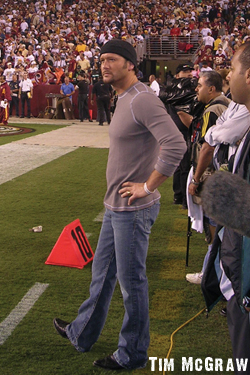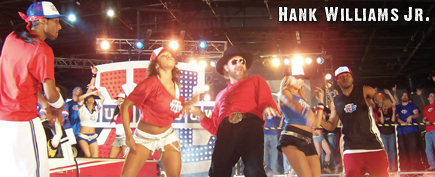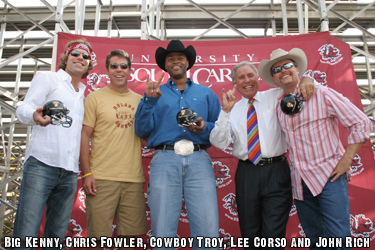Big & Rich have partnered with ESPN since 2004 when the duo did a large promotion for the network using their single, "Save A Horse, Ride A Cowboy," their manager Marc Oswald said. The network asked for music suggestions for last season's "College GameDay" and were given three tracks off the duo's latest album, including "Coming To Your City." As part of the one-year deal, Big & Rich opened the season with a performance at the University of South Carolina marking Steve Spurrier's return, and they closed the season with a six-song concert before the Rose Bowl national title game.
The partnerships worked because McGraw and Big & Rich each cultivate an image, or brand, that blends well with sports, Jankowski said.
Meanwhile, Williams, who helped define the core image of pro football, made his fifth Super Bowl appearance, singing in the pre-filmed opening introduction to the game between the Pittsburgh Steelers and Seattle Seahawks.
Country Industry Makes Inroads To World Of Sports
By Amy Green
© 2006 CMA Close Up News Service / Country Music Association, Inc.


July 18, 2006
Tim McGraw watches a Washington Redskins game before his halftime performance in 2004. Photographer: Kelly Wright
Are you ready for some football?
Hank Williams Jr. made the question famous, but a growing number of Country artists - Big & Rich and Tim McGraw among them - have moved to "the big leagues" to lend their names to promote national sports events and shows.
Artists long have sung the national anthem during pre-game shows - both Brooks & Dunn and Carrie Underwood performed for the last NBA Playoff series of games. And acts have long rendered their own tunes at halftime shows. What's new is Country's more prominent place in promoting national sports. More than a decade after Williams first asked his rowdy question on ABC's "Monday Night Football," McGraw joined the broadcast with his song, "I Like It, I Love it," and Big & Rich joined ESPN's "College GameDay" with their song, "Coming To Your City," the first single from their sophomore album, released in November 2005.
The trend to feature more Country acts is a result of broadening audiences both for Country and sports, said Kathy Armistead of the William Morris Agency, a talent and literary agency. Country now borrows sounds and fans from rock and pop, while sports saturates fans with its many cable shows and video games. The fan bases have collided, she said.
"I think it's new for the mass market to choose a Country song to maybe anchor a sportscast or a large event in the sports world, to choose a Country song versus maybe an old rock anthem from the '80s," said Armistead, a Nashville agent who specializes in commercials, endorsements and tour sponsorships.
Big & Rich with special guest Cowboy Troy perform before the South Carolina and Central Florida game on Aug. 30, 2005, for ESPN's "College GameDay." (l-r) Big Kenny; "GameDay" anchor Chris Fowler; Cowboy Troy; "GameDay" studio analyst Lee Corso; and John Rich Photographer: Travis Bell


Hank Williams, Jr. films the opening intro to Super Bowl XL.
Photo courtesy of Webster & Associates
The entire industry stands to benefit, said Paul Jankowski, whose Nashville agency provides brand development services for companies and celebrities from Jo Dee Messina to Beyonce to Evander Holyfield.
"I think Country Music is very relevant right now," he said. "It's all about marketing. It's about having an edge. It's about having something fresh and new, and so when they're marketing those programs, music is an enormous part of the brand that they're trying to portray. It's a huge testament again to Country Music."
Often it's the lyric or mood of the Country song that connects with the audience which sports program producers want to target. ESPN featured Carolina Rain's raucous song, "Let's Get It On," during its "College Football Primetime" show in November.
Most times a network contacts an artist's agency or management about a deal, perhaps after an executive is inspired by personal preference or a recommendation from a family member. But it can work both ways. An artist's management may pitch song placements, too. After negotiations, the appropriate parties agree to a song licensing deal for a specified time. Sometimes the deal may include performances or appearances.
Artists must have a clear brand. They must demonstrate they are relevant through tours and sales, but also that they are relevant to what the network is promoting, Jankowski said. The artist's demographic and brand should match that of the sports program. For example, McGraw is ideal for "Monday Night Football" because he is athletic, a co-owner of the Arena Football League's Nashville Kats and he appeals to both men and women. Trace Adkins, known for his brawn and bass voice, was a good choice for the 2004 "Orange Bowl Fed Ex Halftime Show," along with mainstream pop celebrities Kelly Clarkson and Ashlee Simpson.
"How can my artist help you move your product?" Jankowski asked. "I need to understand their business and what drives their bottom line way beyond 'they can stamp a banner on my tour bus.' That is the new generation of building marketing partnerships."
ABC executives suggested a "Monday Night Football" partnership with McGraw in 2004 after McGraw performed during halftime at a Washington Redskins game, his manager Scott Siman said. The two parties negotiated for six months and for the 2005 season decided to air weekend highlights to the chorus, "I Like It, I Love It," with lyrics rewritten each week to match the highlights. It's not been decided whether McGraw will continue with "Monday Night Football" now that it has moved to ESPN, Siman said.
"It was a good thing for both of us," he said. "It was a ratings success from their perspective, and from ours we saw a really dramatic increase in the sale of Tim's greatest hits record after the 'Monday Night Football' program."
Country and sports likely will continue expanding the partnership, said CMA Board member Robert Deaton, Co-owner of Deaton Flanigen Productions, which directed and produced Williams' "Monday Night Football" opening for eight years.
"Sports is about America, and that's what Country is. Country Music is about America," he said. "It goes hand-in-hand."